Students Forge Connections with Spartanburg’s Older Adults for Innovative Theatre Production
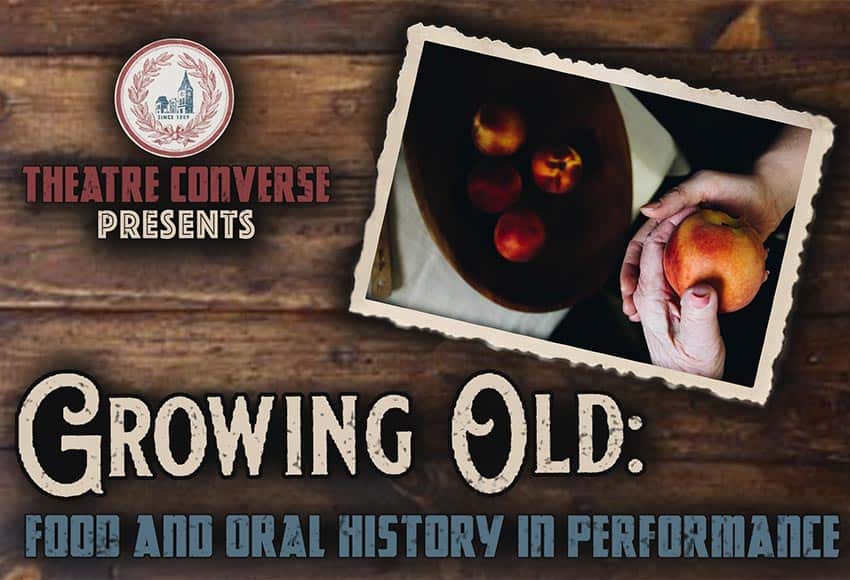
A Theatre Converse production took students into the Spartanburg community to explore and affect positive change in two key areas that impact older adults: food insecurity and social isolation. The grant-funded initiative resulted in a “devised theatre” production, meaning one in which the entire performing ensemble develops the show collaboratively.
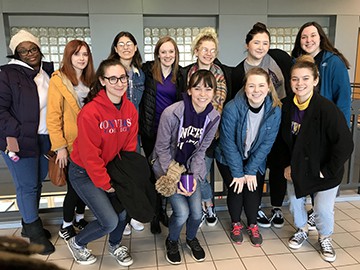
MLK Day of Service Using movement, song, recipes, monologues, and storytelling, the students and Dr. Hopkins staged the show, Growing Old: Food and Oral History in Performance in Hazel B. Abbott Theatre, located in Wilson Hall on the Converse College campus. The issues of food insecurity and social isolation, says Director Dr. Chandra Owenby Hopkins, are also critical ones for college-age women.
Hopkins created the concept and secured a national grant to support it. Her cast of 10 students has been doing service work throughout Spartanburg over the last several weeks in partnership with eight community organizations to prepare for the production. These “service rehearsals”, as the cast calls them, have enabled the students to forge connections with aging women across the community. They have included Mobile Meals delivery; coffee and conversation events with seniors at the Shepherd’s Center, Bethlehem Center, and Archibald Rutledge Senior Housing; oral history interviews and dinner at Summit Hills; a pop-up nail salon with women of Magnolia Manor; serving meals at the Spartanburg Soup Kitchen; and working on a Habitat for Humanity home.
Theatre, like aging, has the capacity to bring us closer, to have honest conversations about what it means to be human, and to build empathy and compassion.
Hopkins explains, “Unlike traditional theatre rehearsals where you might rehearse the lines and movements that bring a character to life, community-based devised work requires a foundation of shared experience. Our show was built from the service we complete, from the memories and recipes shared by those we serve, and through getting off campus and working in real ways with our neighbors across the city.” The creative team includes set design by Converse Professor Meg Hanna Tominaga, lighting by guest Atlanta-based designer Maranda DeBusk, and costumes by Converse Professor Melissa Owens. Audience talkbacks will be held after every performance, and two 20-minute performances of the show will be taken back to the Shepherd’s Center and the Archibald Rutledge Senior Housing to share with community members who may not be able to come to campus.
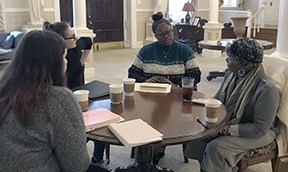
Interviewing Dr. Chivon Mingo, Assistant Professor of Gerontology at Georgia State University, “Theatre, like aging, has the capacity to bring us closer, to have honest conversations about what it means to be human, and to build empathy and compassion,” said Hopkins. “I’m thrilled and honored to work with this Converse student cast and our incredible Spartanburg neighbors as we cook up something special together on stage!” Converse Provost Jeff Barker praised Hopkins and Theatre Converse for “pioneering devised theater in Spartanburg, taking students into the community to create a work both entertaining and of service to others.”
Noting that this innovative approach gained the support of the AARP Foundation and the Council of Independent Colleges through their grant program, Intergenerational Connections: Students Serving Older Adults, Barker also commented, “Dr. Hopkins and her students are part of Converse’s commitment to our mission and our Founder’s Ideal, that students learn to ‘see clearly, decide wisely, and act justly.’” In addition to service work, the students have conducted in-depth interviews with Converse Professor Emerita of Dance, Janis Dengler, Converse alumna Mary Lib Spillers Hamilton, and Dr. Chivon Mingo, Assistant Professor of Gerontology at Georgia State University.
What has truly stood out to me about this process are the shared experiences across generational barriers.
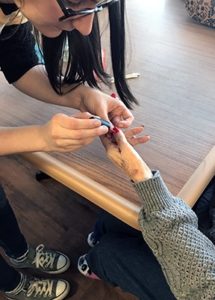
“The research process has been a combination of collecting oral histories, compiling statistical information, and connecting with the community,” said junior Layla Thurmond, who is double majoring in theatre and history. “What has truly stood out to me about this process are the shared experiences across generational barriers. Humans, like all living creatures share a need for food. We have taken a necessity and applied to it different social constructs which have altered our perception of food. And those perceptions linger through generations. Food can be a cultural tie, or perhaps something that is struggled for, it can be the most heartwarming family memories of baking, or it can become an enemy due to diet culture.”
Painting nails for women at Magnolia Manor Thurmond says the experience has taught her many lessons, and she considers the most important to be that “as we age, we should make decisions that will lead to a happy and healthy life, not only physically but emotionally as well.” The lessons and new friendships have meant a lot to her. “We have been given so much advice from older members of the community and I took each one to heart. But the prevailing idea was that the trick to aging well is to always try to be your best self, learning how to be a better person every day.” Senior Anastacia Hutchinson, who designed an individualized major in social advocacy and communication for the exceptional learner, has found that her work on the project relates a great deal to her major. “My ultimate goal is to normalize and create lasting empathy in the arts for children with special needs,” she said.
For this production, she hopes the women they have served will feel heard and recognized. “We have made it a point to invite all of the amazing people we connected with to the performances and hopefully everyone attending will see a piece of themselves in this show. From the happier moments we recreate to the difficult memories we’ve had to call on, something will be recognizable. We are also making theatre more accessible to them by doing mini performances after we close at Converse.”
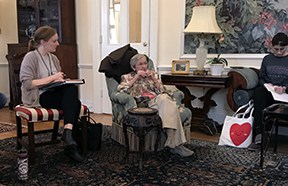
Interviewing Converse Professor Emerita Janis Dengler One of Hutchinson’s favorite moments took place at Archibald Rutledge Senior Housing. “One of the ladies was dictating her sweet potato recipe to me and she said ‘You gotta get that elbow grease in there.’ I responded, ‘Yes ma’am, that’s the only way to do it’ and pointed fondly at her. Then she started pointing at me and we were in this battle of smiling and pointing at each other with the fondness of two best friends who know exactly what the other is talking about. In that moment, we both saw memories of our grandmothers standing on tippy toes, kneading dough for fresh bread or stirring the okra soup in a large stock pot. It warms my heart every time I think about it. I can’t wait to see her again.”